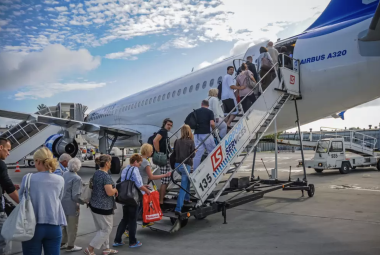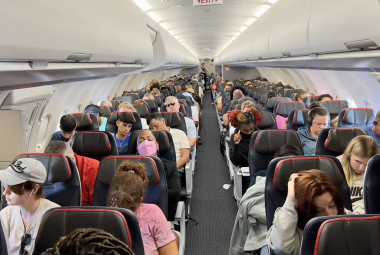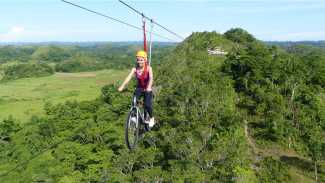Image by urbaneventsglobal.com
*Vacation Mode is a for-profit site. It contains paid banner advertisements that are generated and managed by a third-party network. This site also includes relevant affiliate links (both in the content and on the sidebar) all of which we do our best to clearly mark as such.
Attention all travelers! Are you tired of the same old solo trips? Are you searching for a new way to experience the world? Look no further, as group travel is becoming increasingly popular! This article will explore the latest trends in group travel, providing you with valuable insights and inspiration for your next adventure.
Key Takeaways:
- Group travel is becoming increasingly popular due to cost savings, shared experiences, convenience, and safety in numbers.
- Types of group travel include family trips, friends' getaways, corporate retreats, and educational tours.
- The benefits of group travel include socializing, cost-splitting, learning from others, and safety and security.
What Is Group Travel?
Group travel refers to a gathering of individuals journeying together for leisure, business, or educational purposes. It offers a shared experience and cost savings. In the global hospitality industry, group business is a major contributor to the revenue of hotels and travel agencies. According to studies, over 20% of hotel bookings worldwide are for group travel.
Why Is Group Travel Becoming Popular?
Group travel has been experiencing a revival in recent years, with more and more people opting to travel with friends, family, or even strangers. This trend can be attributed to a variety of factors, including the desire to relive fond memories, the potential for increased revenue opportunities, and the overall convenience of traveling in a group. In this section, we'll delve into the reasons behind the growing popularity of group travel, including cost savings, shared experiences, convenience, and safety in numbers. By understanding these factors, we can gain insights into the efficient strategies used by group travelers and their impact on the travel industry.
1. Cost Savings
- Compare Prices: Research and compare group travel packages to identify the best cost-saving options.
- Plan Ahead: Book flights and accommodations well in advance to secure lower group rates.
- Use Efficient Strategies: Utilize group discounts for attractions, transportation, and meals to maximize cost savings.
2. Shared Experiences
- Participate in interactive activities such as cooking classes or team challenges.
- Encourage members of the group to share personal stories and insights during travel.
- Organize group outings to historical sites or cultural events to create shared memories.
- Coordinate group discussions or reflection sessions to exchange experiences.
A successful plan to improve customer relations can enhance customer satisfaction and loyalty among travelers.
3. Convenience
- Research and compare group travel packages and itineraries for convenience.
- Opt for group bookings to enjoy cost savings and added perks.
- Consider a slight increase in travel time for the convenience of traveling in a group.
When choosing group travel, look for packages that offer convenience, such as pre-arranged itineraries and inclusive amenities. Opting for group bookings not only provides cost savings but also ensures convenience in planning. Although there may be a small increase in travel time, the overall convenience of traveling in a group outweighs this minor factor.
4. Safety in Numbers
- Stay in groups, particularly when in unfamiliar or potentially unsafe areas.
- Utilize group hotel room nights to negotiate better rates and ensure safety in numbers.
- Inform each other of whereabouts and schedule regular check-ins to maintain safety and security.
- Keep an eye on overall hotel occupancy to ensure group safety and access to help if needed.
In history, during the Great Depression, safety in numbers became crucial for many families who formed groups to travel together, ensuring mutual support and safety during difficult times.
What Are the Different Types of Group Travel?

Group travel has become increasingly popular in recent years, with more people seeking out the experience of exploring new destinations with their loved ones, colleagues, or like-minded individuals. In this section, we will delve into the different types of group travel, including family trips, friends' getaways, corporate retreats, and educational tours. Each type offers a unique dynamic and set of benefits, and we'll explore the key features and trends within each category.
1. Family Trips
- Plan ahead: Research and book accommodations and activities in advance for better rates, especially during non-holiday seasons.
- Engage everyone: Discuss and involve all family members in selecting destinations and activities to ensure everyone's interests are considered.
- Utilize small teams: If the family is large, consider dividing into smaller teams for smoother decision-making and coordination.
Pro-tip: Encourage each family member to take on a specific responsibility for planning and execution to distribute the workload and ensure a successful and enjoyable trip.
2. Friends' Getaways
- Choose a destination that offers activities and attractions appealing to all friends' interests.
- Consider staying at larger hotels to accommodate a group or opt for boutique hoteliers that offer personalized experiences for a more intimate setting.
- Plan group activities and excursions that cater to diverse preferences, ensuring everyone has an enjoyable and memorable experience.
- Coordinate travel logistics and accommodations well in advance to secure bookings and ensure a smooth and hassle-free trip.
3. Corporate Retreats
- Define goals: Determine the purpose of the retreat, whether team building, strategy planning, or employee recognition.
- Choose a suitable location: Consider a serene environment conducive to relaxation and focus.
- Plan engaging activities: Incorporate team-building exercises and workshops to encourage collaboration.
- Utilize technology: Integrate data-led technology solutions for efficient planning and execution.
Consider current state trends, such as embracing sustainable practices and digital detox experiences, to enhance the overall retreat experience.
4. Educational Tours
- Select educational tours that focus on history, culture, or specific subjects that align with shifting sustainability expectations.
- Engage with local experts and indigenous communities for authentic learning experiences that promote sustainability.
- Encourage interactive learning through workshops, hands-on activities, and immersive cultural experiences that promote sustainable practices.
- Implement sustainable practices by supporting eco-friendly accommodations and engaging in community service projects that align with shifting sustainability expectations.
What Are the Benefits of Group Travel?

Group travel has become increasingly popular in recent years, as travelers seek a more social and cost-effective way to explore the world. But the benefits of group travel go beyond just saving money and making new friends. In this section, we will delve into the various advantages that group travel offers, such as the opportunity for socializing and networking, splitting costs among travelers, learning from others' experiences and perspectives, and the added safety and security that comes with traveling in a group. Let's take a closer look at each of these benefits and how they contribute to the growing trend of group travel.
1. Opportunity for Socializing
- Enhance guest experience by organizing meet-and-greet sessions or social events during the trip.
- Engage Business Travel Leaders to facilitate networking opportunities and group activities.
- Encourage participation in group games, team-building exercises, or themed parties to foster connections.
- Facilitate casual gatherings through designated communal areas or group dining arrangements.
2. Splitting Costs
- Calculate the overall expenses for the trip, including accommodation, transportation, meals, and activities.
- Divide the total cost by the number of travelers to determine the individual contribution.
- Consider creating a shared fund where each participant contributes a set amount regularly.
- Choose accommodations with shared rooms or vacation rentals to decrease individual costs.
Splitting costs in group travel can result in considerable savings, making trips more affordable and enjoyable.
3. Learning from Others
- Attend workshops and seminars led by business travel leaders to gain insights and strategies for personal and professional growth.
- Engage in networking sessions to learn from others' experiences and gain valuable contacts for future collaboration.
- Participate in mentorship programs to leverage the knowledge and expertise of business travel leaders, fostering positive momentum in your career.
4. Safety and Security
- Have clear guidelines for behavior and conflict resolution to minimize potential conflicts.
- Ensure open communication among group members to address any conflicts that may arise.
- Implement safety measures, including emergency contacts and first aid kits, to enhance safety and security.
- Stay informed about the latest travel advisories and safety precautions, taking into account the clear upward trend in safety and security concerns.
What Are the Challenges of Group Travel?
Group travel can be a fun and exciting way to explore new destinations with friends, family, or colleagues. However, it also comes with its own set of challenges. In this section, we will delve into the various challenges that can arise when planning and executing a group trip. From conflicting interests to logistics and group dynamics, we will discuss the potential roadblocks that can affect the success of group travel. By understanding these challenges, we can better prepare for and overcome them, ensuring a smooth and enjoyable group travel experience for all.
1. Conflicting Interests
- Discuss individual preferences upfront to understand everyone's interests.
- Consider compromise and voting on conflicting choices.
- Plan free time for members to pursue personal interests.
- Encourage open communication to address conflicts as they arise.
Historically, in the 19th century, the discovery of gold in California led to a surge in group travel, where prospectors journeyed together, collectively spending a total of over 1.5 million hotel nights. This trend marked a greater proportion of travelers moving towards group excursions for shared benefits and experiences.
2. Logistics and Planning , Clear Upward Trend)
- Utilize digital tools and project management software to streamline the planning process and track tasks and deadlines.
- Efficiently coordinate and execute tasks by assigning clear roles and responsibilities to group members.
- Establish open communication channels to promptly address any logistic issues and ensure smooth operations.
- Analyze data on the number of requests for proposals (RFPs) to identify patterns and forecast future demand, taking into consideration the clear upward trend.
3. Group Dynamics
- Communication: Establish open communication channels to encourage transparency within the group.
- Role Assignment: Define roles and responsibilities to avoid confusion and ensure smooth operations.
- Conflict Resolution: Implement a structured approach to address conflicts promptly and amicably.
- Flexibility: Remain adaptable to accommodate diverse preferences and needs within the group.
When managing group dynamics, leveraging meeting broker data can provide insights into optimizing interactions. As the popularity of group travel has risen significantly, prioritizing effective dynamics is crucial for a memorable experience.
4. Potential for Conflicts
- Communication: Establish open and transparent communication channels to address potential conflicts proactively and contribute to a clear upward trend in group dynamics.
- Expectations: Set clear expectations and guidelines for behavior to mitigate the potential for conflicts and promote a positive trajectory for the group.
- Conflict Resolution: Develop a conflict resolution plan that outlines steps to address conflicts if they arise and maintain the upward trend in group dynamics.
- Mediation: Designate a neutral party or mediator to help resolve conflicts and maintain group harmony, ultimately contributing to a clear upward trend in group dynamics.
FAQs about Group Travel Trends
What are the current trends in group travel?
The current state of group travel is recovering quickly post-pandemic, with an increase of 18% in group hotel room nights booked worldwide in H1 2023 compared to the same time last year. Additionally, group bookings now make up a higher proportion of overall hotel occupancy, providing a noticeable boost in annual revenue.
How is technology changing the landscape of group travel?
New data-led technology solutions are allowing more efficient strategies for group travel, making it possible for even smaller hotels to cater to group bookings. Centralized meeting distribution and automation technology can also streamline processes and make group travel more efficient.
What are the key changes in group travel that hoteliers must adapt to?
Some key changes in group travel include shifting sustainability expectations, catering to a post-pandemic perspective, appealing to the blended or ‘bleisure’ traveller, and personalizing offerings to each group agenda. Staying on top of these changes is crucial for hoteliers to attract and retain group business.
What data is available to help hoteliers plan for group travel?
Amadeus offers comprehensive data sets on demand, rates, and group preferences to help hoteliers predict waves of travel and prioritize their limited resources. This data can also assist in implementing pragmatic actions to succeed amid the changing events landscape.
What are some ways for hoteliers to appeal to bleisure travelers (business/leisure)?
Hoteliers can appeal to bleisure travelers by offering flexible conference agendas that accommodate business travelers looking to experience other amenities and services at the property. Additionally, personalized marketing promotions and a well-timed approach can convert conference guests into loyal bleisure guests.
How can hoteliers stay on top of group travel trends?
Hoteliers can stay on top of group travel trends by leveraging technology such as sales and catering software, like Amadeus’ Delphi®, to prospect business and execute events with ease while providing data insights for consistent demand and loyalty. Additionally, staying informed on changing guest expectations and using data to personalize offerings can help keep groups coming back to the hotel.


















